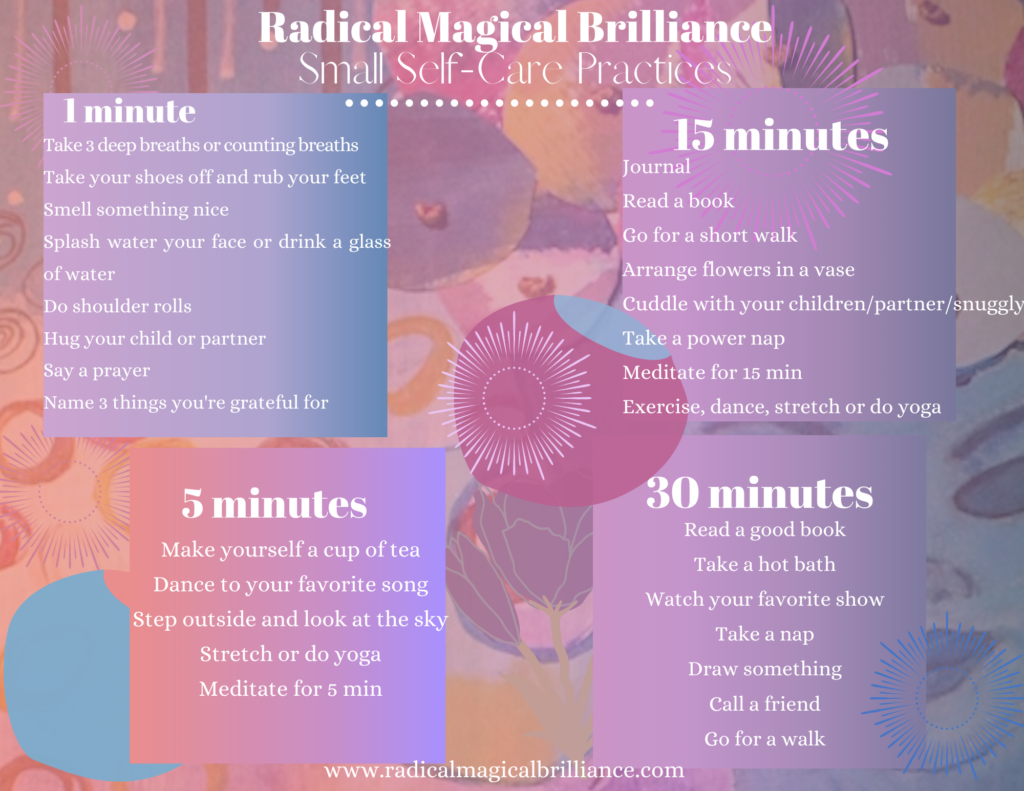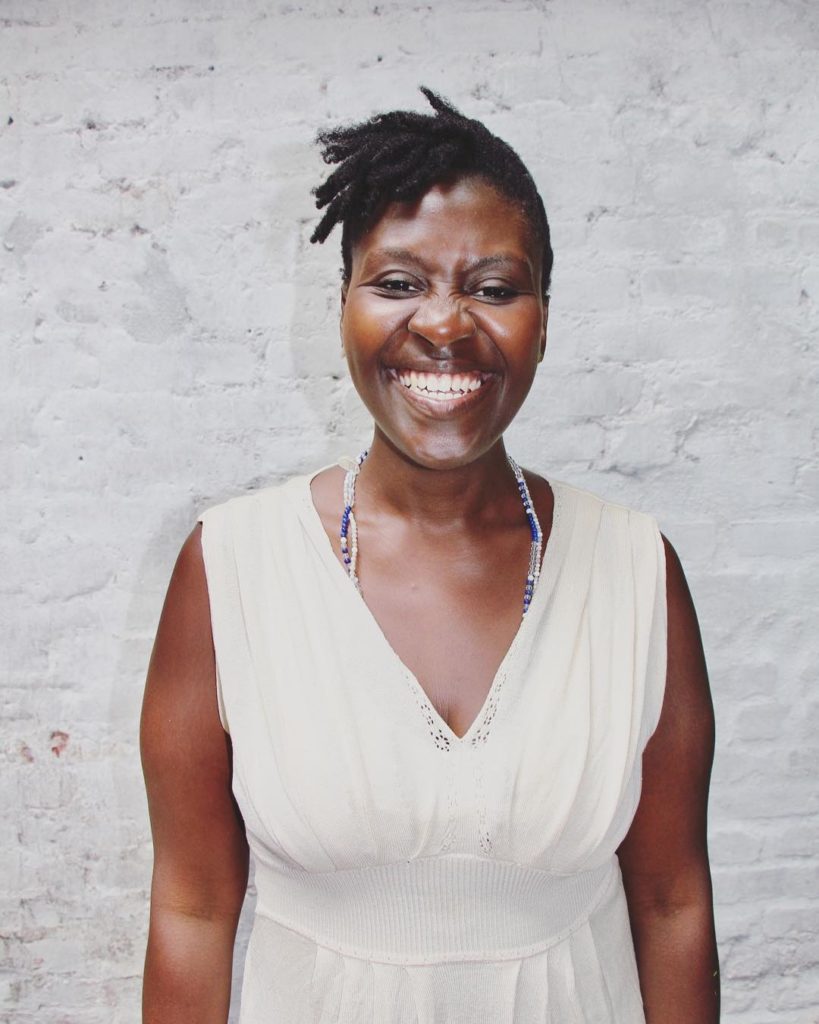S3/Epi.23: Interview with Ree of Fort Negrita (Earth Day Special)
To learn more about Ree’s work, please visit www.fortnegrita.com
Centering the Well-Being of Black Women
To learn more about Ree’s work, please visit www.fortnegrita.com
A New Orleanian by birth and New Yorker by choice, Keturah Kendrick has been penning insights about life at the intersection of race and gender for a decade. Aside from her popular blog, Yet Another Single Gal, she has written for The Unfit Christian, The Not Mom, NonParents, and …
By GaBrilla Ballard
Graphic by GaBrilla Ballard(Copyright 2020. All Rights Reserved)
As we support ourselves and each other in #flatteningthecure, I want to encourage you to fit in self-care. As many of you, I am home with my children, and it sometimes makes it harder to take care of yourself, but I believe we need to make it a priority now more than ever.
I have created a graphic for you to print out and place on you wall, bulletin board or any place you can see it often. These practices range from one minutes to 30 minutes. So short, you can’t NOT do them.

Please print it out and share with your loved ones.
Take care of yourselves.
By GaBrilla Ballard (Transcript) I came on to offer words of support and love to you my growing community, as I’m sure you have been inundated with more news than you probably want. Some of you are very worried, as am I and some of …
dana e. fitchett, director of defDances, is a multi- and inter-disciplinary artist, movement educator, MFA candidate, and radical mixed-race Black woman exploring questions of identity reconciliation and decolonization by way of creative expression and reimagination of what’s possible. She lives in Oakland, CA, and splits …
(This post is the transcript for episode 2 from our current season. It can be heard here)

By Gabrilla Ballard
In the media, many of us have heard the story of Serena Williams advocating for herself following the birth of her daughter. A practice that forced her doctors to test her for a life threatening embolism— a vital practice that saved her life. In a later on in this episode, I will be sharing another story about a black woman who advocated for herself in a life changing and life affirming way.
As Black women, we often face institutional barriers to treatment modalities that aid in our well-being. However, some research suggests that medical advocacy may improve outcomes among Black women, as we’ve witnessed for Serena Williams. The findings from a 2016 research study entitled Medical Advocacy among African American women diagnosed with breast cancer demonstrated that “ community/interpersonal advocacy may lead to improved self-advocacy as well as health protective impacts for the networks in which survivors are embedded.” So, we see that not only does our self-advocacy help us, but it helps other black women in our lives and communities.
And now a Black women’s story of self advocacy
[Music]
The patient laid in a hospital bed fighting for her life when the young resident entered the room. Exhausted and irritable after a night interrupted by tests and routine checks for vital signs, she sat up in her bed awaiting his update. He shared inconclusive results, then told her she would need to take a medication for a condition that she hadn’t been diagnosed with—yet. The patient had read about this medication and its very serious side affects and although it was standard treatment for the condition the resident assumed the patient had, she had not been diagnosed and wasn’t comfortable proceeding with the medication. The patient explained to the resident that she and her primary doctor had discussed and agreed upon a different treatment plan,—a treatment plan she had researched and was ok with. Again, she asserted that she would not be taking the new medication he was recommending.
Because she was within the walls of the hospital and under his care, the resident insisted that it was in her best interest to take this medication, despite the lack of a definitive diagnosis. The doctor and patient went back and forth but the patient, knowing that she could refuse treatment at any point, stood firmly on her decision.
Several doctors were sent into her room to sway her, frighten her with worse case scenarios, but it didn’t word. After getting fed up with feeling unheard and disregarded, she ended up telling the resident, “this is my body and I have the last say.” In the end, the patient was successful and continued the treatment plan she was placed on by her primary doctor. In the end, she wasn’t diagnosed with the condition he assumed she would need treatment for. In the end her self-advocacy paid off.
(end music)
I was the patient and this was one of my stories of self-advocacy.
I shared this story because there are many of you who may have had a similar experience, be it in a hospital or a doctors office. I also share my story because, we are each indirectly affected by witnessing each other. By hearing each other stories. I later found out that because of what my mother witnessed, she was able to better advocate for herself.
In addition to sharing my story, I’d like to offer 5 tips or suggestions when advocating for yourself ( or potentially someone else) in medically related situations.
1- Do your research
GO online, talk with friends and family members you trust. Gather as much information as a you on your condition before you go in. And remember, always take notes. (make then show you what they know)
2- Seek clarification
Ask questions and then ask them again. Never proceed with any medications or procedures you don’t understand or feel comfortable with. A treatment that may be standard for most patients, may not necessarily be what’s best for you.
3- Gather support
Bring along a friend, relative or advocate you trust. More often than most of us realize, having a support person with us can help us feel more courageous in asking questions and possibly pushing back if we need to. One of the things I left out of my story was that I had support. My mother was with me the entire time I was in the hospital and I’m not sure what would have happened if she wasn’t. I may have been pressured to give in. But, not only was she there, but she respected and supported my decision. And I truly believe that this made all the difference in how things turned out.
4- Always get a second (and sometimes) 3rd opinion with presumed necessary procedures. Ask if there are medications that would work better for you.
5- Be willing to switch providers.
If you find your doctor doesn’t listen to you, or is demeaning in any way (which they shouldn’t be) find out from your insurance company if and when can you switch providers and if they’re unethical, report them.
This podcast sometimes shares information about mental health and health related topics, but the information shared here is NOT a substitute for treatment from a health care provider or licensed therapist. If you have any concerns, please consult with your doctors or other health care professionals.
Raised in the arms of New Orleans, Ayanna’s vibe is an eclectic mix of spoken word and Hip Hop. Her work is dedicated to uplifting women and using Hip Hop as a tool to teach young people. She has performed in venues across the country…New …
Many of you may come directly to the site to hear the podcast, but we are also on other platforms to make sure we reach as many listeners as possible. Please click the links below if you see a platform you already use or one …

The first episode of the New Year is one I have wanted to share for a while now. I was faced with many challenges at the end of the year, mainly losing my voice and my computer crashing. But by the Most High’s grace and a smart decision to buy a hard drive some months back, I was able to save so much work I’ve created. That said, I am thrilled to share this month’s interview with each of you. B. is a gift, a sage, a human being with so much power and light for the world. Enjoy. And please share widely with your loved ones.
B. Anderson, (they/them), is a sound healer, plant medicine stewart/herbalist, reiki practitioner, mediation teacher, mediator, ritual leader and community organizer. B. calls up the traditions, legacies and medicine of their southern Black American, Jamaican Maroon, Niitsitapi/Blackfoot, and Choctaw ancestry as their healing arts praxis.
A visionary of Love Circle Sangha, a member of Harriet’s Apothecary and member of the board for engaged Buddhist activist organization Buddhist Peace Fellowship, B. combines their experience as a grassroot organizer, and their life principles and practices to co-design community wellness strategies, transformative spaces and generative healing modalities across the country.
B. Recently offered their their talk on “Right Stewardship as an Anecdote to Cultural Genocide” for Tedx Flatbush and shared practice on liberation as an worm through healing sound and collective awareness for the Healing Justice Podcast.